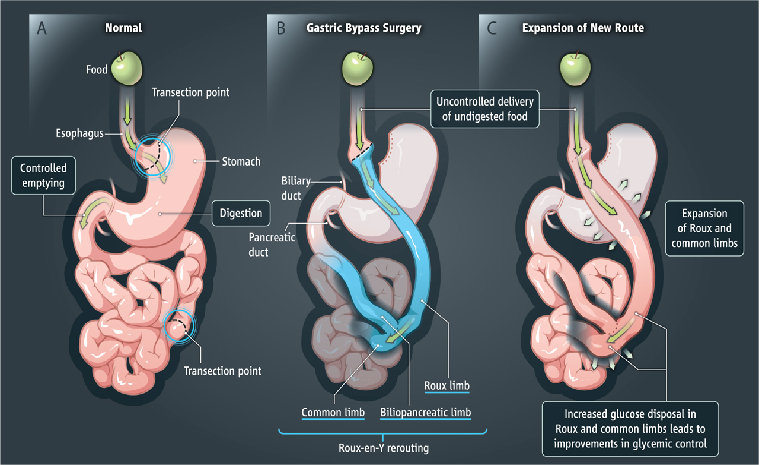Gastric bypass surgery refers to a surgical procedure in which the stomach is divided into a small upper pouch and a much larger lower “remnant” pouch and then the small intestine is rearranged to connect to both. Surgeons have developed several different ways to reconnect the intestine, thus leading to several different gastric bypass (GBP) procedures. Any GBP leads to a marked reduction in the functional volume of the stomach, accompanied by an altered physiological and physical response to food.
Who are eligible for Gastric bypass surgery
Bariatric surgery is an option for people who have a body mass index (BMI) above 40. Surgery is also an option for people with a body mass index between 35 and 40 who have health problems like type 2 diabetes or heart disease.
How is Gastric bypass surgery done?

GBP – Gastric Bypass Surgery
You will have general anesthesia before this surgery. You will be asleep and pain-free.
There are 2 steps during gastric bypass surgery:
- The first step makes your stomach smaller. Your surgeon uses staples to divide your stomach into a small upper section and a larger bottom section. The top section of your stomach (called the pouch) is where the food you eat will go. The pouch is about the size of a walnut. It holds only about 1 ounce (oz) or 28 grams (g) of food. Because of this you will eat less and lose weight.
- The second step is the bypass. Your surgeon connects a small part of your small intestine (the jejunum) to a small hole in your pouch. The food you eat will now travel from the pouch into this new opening and into your small intestine. As a result, your body will absorb fewer calories.
Gastric bypass can be done in two ways. With open surgery, your surgeon makes a large surgical cut to open your belly. The bypass is done by working on your stomach, small intestine, and other organs.
Another way to do this surgery is to use a tiny camera, called a laparoscope. This camera is placed in your belly. The surgery is called laproscopy. The scope allows the surgeon to see inside your belly.
In this surgery:
- The surgeon makes 4 to 6 small cuts in your belly.
- The scope and instruments needed to perform the surgery are inserted through these cuts.
- The camera is connected to a video monitor in the operating room. This allows the surgeon to view inside your belly while doing the operation.
Advantages of laparoscopy over open surgery include:
- Shorter hospital stay and quicker recovery.
- Less pain.
- Smaller scars and a lower risk of getting a hernia or infection.
This surgery takes about 2 to 4 hours.
[box type=”info”] Contact us for Gastric Bypass Surgery Medical Second Opinion, Treatment Plan, Cost Estimate and Tele-Consultation from Top gastric bypass Surgeons and Leading Hospitals. Email: Contact@ExpertChikitsa.com Phone: +91 733 784 7661 / 7662 / 7663[/box]
Recovery and Potential Complications:
After gastric bypass surgery, people typically stay in the hospital for 2 to 3 days and return to normal activity within 2 to 3 weeks. About 10% of people have complications, which are usually minor and include:
Wound infections
Digestive problems
Ulcers
Bleeding
Nearly 1% to 5% of people have serious or life-threatening complications, such as:
Blood clot (pulmonary embolism)
Heart attack
Leak in the surgical connections with the intestines
Serious infection or bleeding
The risk of complications is lower at centers that do more than 100 weight loss surgeries per year. Deaths in the month following gastric bypass surgery are very rare (about 0.2% to 0.5%, or less than one in 200 people) when the procedure is done by a highly experienced surgeon.
Other health problems can also happen as a result of the surgery. For example, not absorbing as much of nutrients like iron and calcium can cause anemia and osteoporosis. But taking nutritional supplements and getting blood tests can make that less likely.
What is the cost of Gastric Bypass Surgery
The four established procedure types (Roux-en-Y gastric bypass, gastric banding, vertical sleeve gastrectomy (gastric sleeve) and duodenal switch) carry an average cost in the United States of $24,000, $15,000, $19,000 and $27,000 respectively.
In India cost of Gastric Bypass Surgery,
Sleeve Gastrectomy – $6,000
Mini Gastric Bypass – $7,000
FOR MORE INFORMATION ON BEST DOCTOR & HOSPITAL, TREATMENT PLAN, COST , TELE-CONSULTATION AND SECOND OPINION CONTACT US,
Phone Numbers: +91 733 784 7661 / 62 / 63
Mail Id: Contact@Expertchikitsa.com
Facebook: https://www.facebook.com/ExpertChikitsa
Website: https://www.expertchikitsa.com/



